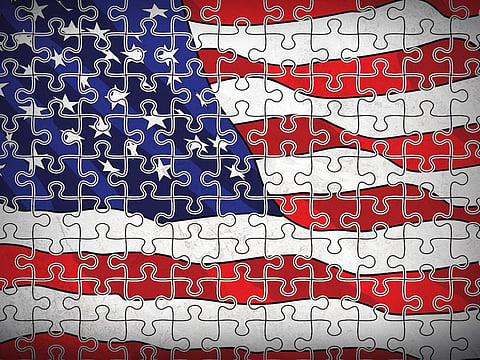America should see itself as one nation
The devastating swarm of tornadoes that swept through Kentucky has lessons for all

On Friday, a devastating swarm of tornadoes swept through Kentucky. The state’s leading figures appealed for federal aid, which was promptly granted — and rightly so. Helping people and communities in need is what nations are supposed to do.
Observers couldn’t help noticing, however, that some of the Kentucky politicians asking for aid — notably Senator Rand Paul — had in the past not only opposed aid for other disaster-struck states but sneered at their pleas. What should we make of this hypocrisy?
The truth is that it runs deeper than “aid for me but not for thee.” Remarkably, if you look at how the federal budget affects US regions, there’s a consistent pattern in which conservative states that preach the importance of self-reliance are in fact heavily subsidised by liberal states, especially in the Northeast.
The Rockefeller Institute publishes regular estimates of states’ “federal balance of payments” — the difference between the amount the feds spend in a state and the amount they collect in taxes. In Virginia and Maryland a lot of federal spending consists of the salaries of government workers. Elsewhere, however, it’s mainly Social Security, Medicare and Medicaid, plus some military spending.
Topping the list of net beneficiaries is, yes, Kentucky, where residents received an average of $14,000 more from Washington DC than they paid in taxes. To put this in perspective, Kentucky’s 2019 net inflow of federal funds — $63 billion — was roughly 30 per cent of the state’s GDP that year.
Economic geographers often interpret regional economies using the “base-multiplier model.” The idea is that what drives a local economy is its “export base,” the stuff it sells to other places; the income generated by that export sector in turn supports jobs in local services, from health care to restaurants. The economy of New York City, for example, is largely driven by the financial industry; the money earned there directly or indirectly supports most of the city’s other jobs.
So what is Kentucky’s export base? Not the traditional industries: In 2019, the state, which has more than four million residents, had fewer than 6,000 coal miners, while the distilling industry — which, to be fair, has been growing — employed only about 5,000 people. On the other hand, more than 250,000 Kentuckians worked in health care and social assistance — and who do you think paid for a lot of that? So, in a real sense, Kentucky’s economy lives on federal dollars.
And that’s OK! The main reason Kentucky is such a large net recipient of federal funds is that the state is relatively poor — it’s in a region that has to some extent been economically stranded as production and wealth concentrate in large, highly educated metropolitan areas.
As a lower-income state, Kentucky receives the full benefit of federal programs like Medicare, but pays relatively little in income or payroll taxes, so it gets much more than it pays in. And that is actually how the social safety net is supposed to work. We want individuals who for whatever reason are hurting financially to receive support from the more fortunate, which necessarily implies large transfers from rich states like New Jersey to lower-income states like Kentucky.
What’s not OK is when states that are huge net beneficiaries of progressive taxation and the social safety net preen and posture about self-reliance and the evils of big government. It’s even worse when they assert some kind of moral superiority over the metropolitan areas that pay their bills.
I mean, it’s amazing that we’re still doing the thing where small towns and rural areas are held up as the “real America,” where politicians from, say, Montana are still lecturing urbanites that they need to get out of the big cities. Yes, it would probably be a good thing if more New Yorkers had a sense of what life is like in Montana. But how many Montanans have a good sense of what life is like in Queens — which happens to have twice Montana’s population?
Not that Queens is the real America — or at least no more than anywhere else in this nation. We should see ourselves as one nation. And it would be nice if people in places like Kentucky both accepted that and acknowledged how much they benefit from being part of a greater whole.
Paul Krugman is one of America’s foremost public intellectuals and academics. He won the Nobel Prize for Economics in 2008 for his contributions to New Trade Theory and New Economic Geography



